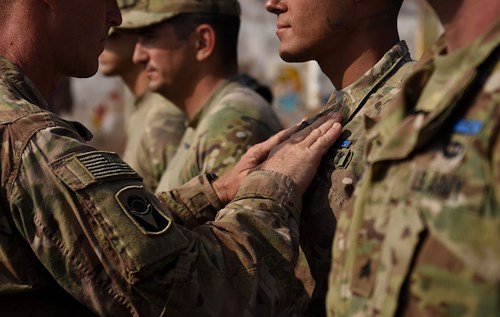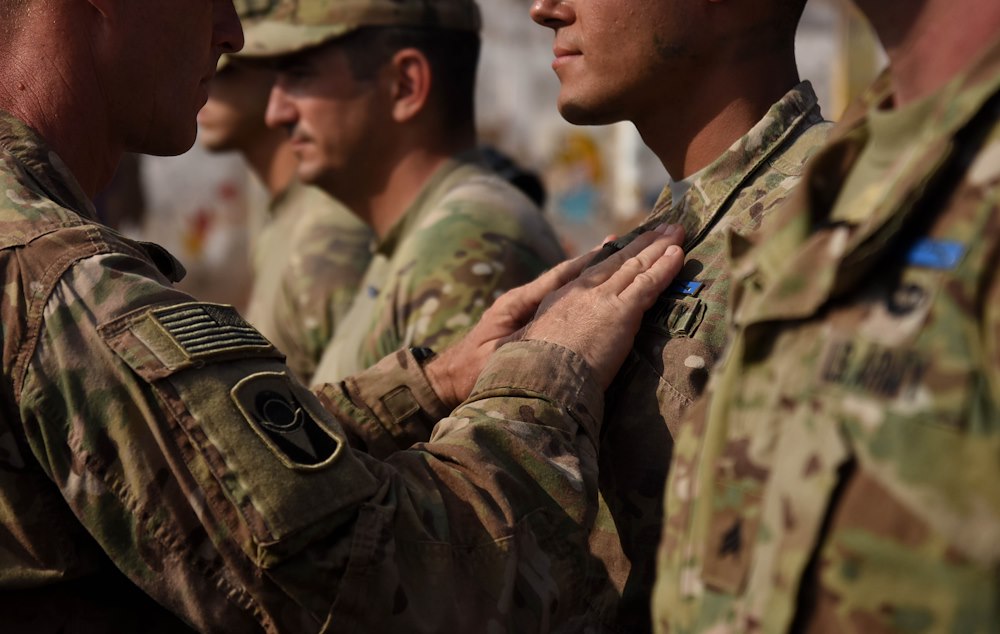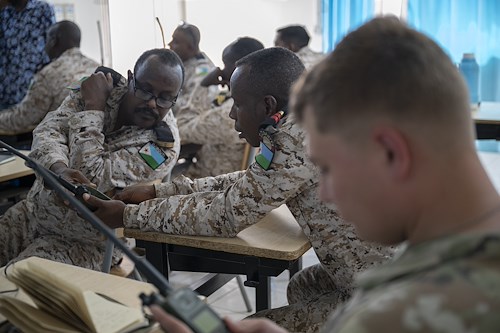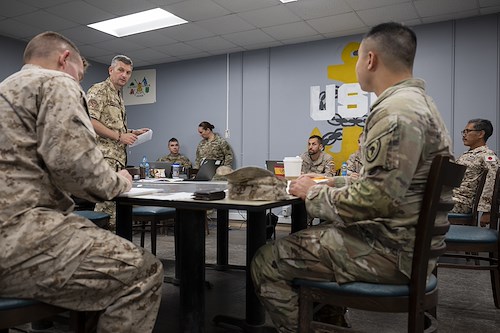Gallery contains 30 images
×
Photo 1 of 30
Combined Joint Task Force - Horn of Africa Image
U.S. Army cadres pin badges on Soldiers during an Expert Infantry Badge pinning ceremony April 1, 2016, at Arta, Djibouti. The EIB signifies the most skilled infantry members, proving themselves masters of physical fitness, night and day land navigation, weapons, combat medical techniques, patrolling, a 12-mile road march, and the Objective Bull. (U.S. Air Force photo by Staff Sgt. Kate Thornton)
Photo by: Staff Sgt. Kate Thornton
Photo 2 of 30
Combined Joint Task Force - Horn of Africa Image
U.S. Army Expert Infantry Badge testing cadres discuss nighttime land navigation before testing the candidates March 27, 2016, at Arta, Djibouti. Authorities from EIB testing headquarters at Fort Benning, Ga., travelled here to make sure the course met the very high standard of every EIB test, and they approved the course, cadre and curriculum for the intense week of evaluations. (U.S. Air Force photo by Staff Sgt. Kate Thornton)
Photo by: Staff Sgt. Kate Thornton
Photo 3 of 30
Combined Joint Task Force - Horn of Africa Image
A U.S. Army Expert Infantry Badge candidate reads land navigation documents March 27, 2016, during the nighttime land navigation portion of the EIB course at Arta, Djibouti. Candidates had three hours to find three different points in the dark and rocky terrain of Arta using only their red light, map, protractor, and compass. (U.S. Air Force photo by Staff Sgt. Kate Thornton)
Photo by: Staff Sgt. Kate Thornton
Photo 4 of 30
Combined Joint Task Force - Horn of Africa Image
A U.S. Army Expert Infantry Badge candidate reads land navigation documents March 27, 2016, during the night-time land navigation portion of the EIB course at Arta, Djibouti. Candidates had three hours to find three different points in the dark and rocky terrain of Arta using only their red light, map, protractor, and compass. (U.S. Air Force photo by Staff Sgt. Kate Thornton)
Photo by: Staff Sgt. Kate Thornton
Photo 5 of 30
Combined Joint Task Force - Horn of Africa Image
U.S. Army Expert Infantry Badge testing cadres accept a candidate for testing March 29, 2016, during the weapons portion of the EIB course at Camp Lemonnier, Djibouti. Authorities from EIB testing headquarters at Fort Benning, Ga., travelled here to make sure the course met the very high standard of every EIB test, and they approved the course, cadre and curriculum for the intense week of evaluations. (U.S. Air Force photo by Staff Sgt. Kate Thornton)
Photo by: Staff Sgt. Kate Thornton
Photo 6 of 30
Combined Joint Task Force - Horn of Africa Image
U.S. Army 1st Lt. Alexander Repp, Expert Infantry Badge candidate, practices before approaching the testing tent March 29, 2016, during the weapons portion of the EIB course at Camp Lemonnier, Djibouti. As they moved through each day and each test, they received a “go” or “no go” indicating their status. (U.S. Air Force photo by Staff Sgt. Kate Thornton)
Photo by: Staff Sgt. Kate Thornton
Photo 7 of 30
Combined Joint Task Force - Horn of Africa Image
U.S. Army Spc. Jeremy Cicio, Expert Infantry Badge candidate, performs a mortar test March 29, 2016, during the weapons portion of the EIB course at Camp Lemonnier, Djibouti. The weapons portion involved a variety of systems and required proficient knowledge of preparing each weapon for use, all of which were timed. (U.S. Air Force photo by Staff Sgt. Kate Thornton)
Photo by: Staff Sgt. Kate Thornton
Photo 8 of 30
Combined Joint Task Force - Horn of Africa Image
U.S. Army Spc. Jeremy Cicio, Expert Infantry Badge candidate, performs a mortar test March 29, 2016, during the weapons portion of the EIB course at Camp Lemonnier, Djibouti. The weapons portion involved a variety of systems and required proficient knowledge of preparing each weapon for use, all of which were timed. (U.S. Air Force photo by Staff Sgt. Kate Thornton)
Photo by: Staff Sgt. Kate Thornton
Photo 9 of 30
Combined Joint Task Force - Horn of Africa Image
A U.S. Army Expert Infantry Badge testing cadre times a candidate March 29, 2016, during the weapons portion of the EIB course at Camp Lemonnier, Djibouti. All of the events were timed, and as they moved through each day and each test, they received a “go” or “no go” indicating their status. (U.S. Air Force photo by Staff Sgt. Kate Thornton)
Photo by: Staff Sgt. Kate Thornton
Photo 10 of 30
Combined Joint Task Force - Horn of Africa Image
A U.S. Army Expert Infantry Badge candidate treats a simulated burn March 30, 2016, during the medical portion of the EIB course at Camp Lemonnier, Djibouti. Each candidate was tested on a variety of medical issues that could happen in combat, ensuring they’re prepared to care for their fellow Soldiers in need. (U.S. Air Force photo by Staff Sgt. Kate Thornton)
Photo by: Staff Sgt. Kate Thornton
Photo 11 of 30
Combined Joint Task Force - Horn of Africa Image
French Army Cpl. Timothy, Expert Infantry Badge candidate, treats a simulated patient while being evaluated March 30, 2016, during the medical portion of the EIB course at Camp Lemonnier, Djibouti. Since 1944, there haven’t been many changes to the EIB process, but this course proved different in more ways than one as several French infantrymen also participated. (U.S. Air Force photo by Staff Sgt. Kate Thornton)
Photo by: Staff Sgt. Kate Thornton
Photo 12 of 30
Combined Joint Task Force - Horn of Africa Image
French Army Sgt. Florian Expert Infantry Badge candidate, treats a simulated patient March 30, 2016, during the medical portion of the EIB course at Camp Lemonnier, Djibouti. Since 1944, there haven’t been many changes to the EIB process, but this course proved different in more ways than one as several French infantrymen also participated. (U.S. Air Force photo by Staff Sgt. Kate Thornton)
Photo by: Staff Sgt. Kate Thornton
Photo 13 of 30
Combined Joint Task Force - Horn of Africa Image
U.S. Army Soldiers indicate how they’re doing throughout an Expert Infantry Badge course March 31, 2016, at Camp Lemonnier, Djibouti. Starting with 119 Soldiers, the process stayed true to its vigorous and elite standards, eliminating 85 percent of skilled infantrymen throughout the week. (U.S. Air Force photo by Staff Sgt. Kate Thornton)
Photo by: Staff Sgt. Kate Thornton
Photo 14 of 30
Combined Joint Task Force - Horn of Africa Image
U.S. Army Spc. Eddie Tapia, Expert Infantry Badge candidate, applies camouflage paint to his face March 31, 2016, during the patrolling portion of the EIB course at Camp Lemonnier, Djibouti. Besides painting their faces and covering equipment with burlap, candidates ensured shiny or brightly colored objects were removed to prevent giving away their position. (U.S. Air Force photo by Staff Sgt. Kate Thornton)
Photo by: Staff Sgt. Kate Thornton
Photo 15 of 30
Combined Joint Task Force - Horn of Africa Image
U.S. Army Spc. Eddie Tapia, Expert Infantry Badge candidate, applies camouflage paint to his face March 31, 2016, during the patrolling portion of the EIB course at Camp Lemonnier, Djibouti. Besides painting their faces and covering equipment with burlap, candidates ensured shiny or brightly colored objects were removed to prevent giving away their position. (U.S. Air Force photo by Staff Sgt. Kate Thornton)
Photo by: Staff Sgt. Kate Thornton
Photo 16 of 30
Combined Joint Task Force - Horn of Africa Image
U.S. Army Expert Infantry Badge candidate completes a gas mask test March 31, 2016, during the patrolling portion of the EIB course at Camp Lemonnier, Djibouti. The patrolling day included the most diverse categories of the course such as face paint, radio calls, hand signals and gas mask drills. (U.S. Air Force photo by Staff Sgt. Kate Thornton)
Photo by: Staff Sgt. Kate Thornton
Photo 17 of 30
Combined Joint Task Force - Horn of Africa Image
A French Army Soldier completes an activity report March 31, 2016, during the patrolling portion of the EIB course at Camp Lemonnier, Djibouti. Candidates had to create a report based on simulated suspicious activity and call it in to the evaluator. (U.S. Air Force photo by Staff Sgt. Kate Thornton)
Photo by: Staff Sgt. Kate Thornton
Photo 18 of 30
Combined Joint Task Force - Horn of Africa Image
A French Army Soldier simulates calling in suspicious activity March 31, 2016, during the patrolling portion of the EIB course at Camp Lemonnier, Djibouti. The patrolling day included the most diverse categories of the course such as face paint, radio calls, hand signals and gas mask drills. (U.S. Air Force photo by Staff Sgt. Kate Thornton)
Photo by: Staff Sgt. Kate Thornton
Photo 19 of 30
Combined Joint Task Force - Horn of Africa Image
U.S. Army Expert Infantry Badge candidate completes a grenade classification test March 31, 2016, during the patrolling portion of the EIB course at Camp Lemonnier, Djibouti. After completing the grenade test, candidates had to complete two different grenade application tests where they threw them 35 feet and into a simulated enemy bunker. (U.S. Air Force photo by Staff Sgt. Kate Thornton)
Photo by: Staff Sgt. Kate Thornton
Photo 20 of 30
Combined Joint Task Force - Horn of Africa Image
U.S. Army Expert Infantry Badge candidate throws a practice grenade March 31, 2016, during the patrolling portion of the EIB course at Camp Lemonnier, Djibouti. After completing the grenade test, candidates had to complete two different grenade application tests where they threw them 35 feet and into a simulated enemy bunker. (U.S. Air Force photo by Staff Sgt. Kate Thornton)
Photo by: Staff Sgt. Kate Thornton
Photo 21 of 30
Combined Joint Task Force - Horn of Africa Image
U.S. Army Soldiers prepare for their 12-mile road march April 1, 2016, during the last portion of the Expert Infantry Badge course at Arta, Djibouti. The EIB course focuses on tasks of an infantryman that build the core foundation of individual proficiency, preparing them to locate, close with, and destroy the enemy through fire and maneuver and repel an enemy assault through fire and close combat. (U.S. Air Force photo by Staff Sgt. Kate Thornton)
Photo by: Staff Sgt. Kate Thornton
Photo 22 of 30
Combined Joint Task Force - Horn of Africa Image
U.S. Army Soldiers perform a 12-mile road march April 1, 2016, during the last portion of the Expert Infantry Badge course at Arta, Djibouti. As they reached the end of the week the infantrymen were put to the test completing a 12-mile road march in less than three hours, followed by the Objective Bull in 20 minutes. (U.S. Air Force photo by Staff Sgt. Kate Thornton)
Photo by: Staff Sgt. Kate Thornton
Photo 23 of 30
Combined Joint Task Force - Horn of Africa Image
U.S. Army Soldiers prepare for Objective Bull April 1, 2016, during the last portion of the Expert Infantry Badge course at Arta, Djibouti. As they reached the end of the week the infantrymen were put to the test completing a 12-mile road march in less than three hours, followed by the Objective Bull in 20 minutes. (U.S. Air Force photo by Staff Sgt. Kate Thornton)
Photo by: Staff Sgt. Kate Thornton
Photo 24 of 30
Combined Joint Task Force - Horn of Africa Image
U.S. Army Expert Infantry Badge candidate treats a simulated casualty April 1, 2016, during the Objective Bull portion of the Expert Infantry Badge course at Arta, Djibouti. The Objective Bull honors the first EIB recipient, Technical Sergeant Walter Bull, who earned the badge in 1944. The final test is a simulated combat casualty care situation requiring physical and psychological strength. (U.S. Air Force photo by Staff Sgt. Kate Thornton)
Photo by: Staff Sgt. Kate Thornton
Photo 25 of 30
Combined Joint Task Force - Horn of Africa Image
U.S. Army Expert Infantry Badge candidate pulls a simulated casualty to safety April 1, 2016, during the Objective Bull portion of the EIB course at Arta, Djibouti. The Objective Bull honors the first EIB recipient, Technical Sergeant Walter Bull, who earned the badge in 1944. The final test is a simulated combat casualty care situation requiring physical and psychological strength. (U.S. Air Force photo by Staff Sgt. Kate Thornton)
Photo by: Staff Sgt. Kate Thornton
Photo 26 of 30
Combined Joint Task Force - Horn of Africa Image
U.S. Army Soldiers congratulate each other after completing an Expert Infantry Badge course April 1, 2016, at Arta, Djibouti. As infantrymen reached the beach and completed their last tasks, high-fives, handshakes and smiles finally resurfaced after enduring the past week. (U.S. Air Force photo by Staff Sgt. Kate Thornton)
Photo by: Staff Sgt. Kate Thornton
Photo 27 of 30
Combined Joint Task Force - Horn of Africa Image
U.S and French Army Soldiers celebrate completing an Expert Infantry Badge course April 1, 2016, at Arta, Djibouti. As infantrymen reached the beach and completed their last tasks, high-fives, handshakes and smiles finally resurfaced after enduring the past week. (U.S. Air Force photo by Staff Sgt. Kate Thornton)
Photo by: Staff Sgt. Kate Thornton
Photo 28 of 30
Combined Joint Task Force - Horn of Africa Image
U.S. Army Soldiers walk into the ocean to celebrate completing an Expert Infantry Badge course April 1, 2016, at Arta, Djibouti. After completing the 12-mile ruck and Objective Bull, some candidates cooled down in the nearby water before changing their uniforms for the pinning ceremony. (U.S. Air Force photo by Staff Sgt. Kate Thornton)
Photo by: Staff Sgt. Kate Thornton
Photo 29 of 30
Combined Joint Task Force - Horn of Africa Image
U.S. and French Army Soldiers begin an Expert Infantry Badge pinning ceremony April 1, 2016, at Arta, Djibouti. The EIB course focuses on tasks of an infantryman that build the core foundation of individual proficiency, preparing them to locate, close with, and destroy the enemy through fire and maneuver and repel an enemy assault through fire and close combat. (U.S. Air Force photo by Staff Sgt. Kate Thornton)
Photo by: Staff Sgt. Kate Thornton
Photo 30 of 30
Combined Joint Task Force - Horn of Africa Image
U.S. Army cadres pin badges on Soldiers during an Expert Infantry Badge pinning ceremony April 1, 2016, at Arta, Djibouti. The EIB signifies the most skilled infantry members, proving themselves masters of physical fitness, night and day land navigation, weapons, combat medical techniques, patrolling, a 12-mile road march, and the Objective Bull. (U.S. Air Force photo by Staff Sgt. Kate Thornton)
Photo by: Staff Sgt. Kate Thornton
After six days of testing, 18 U.S. and French Soldiers emerged victorious from the most recent Expert Infantry Badge process, April 1, 2016, in Djibouti.
The EIB signifies the most skilled infantry members, proving themselves masters of physical fitness, night and day land navigation, weapons, combat medical techniques, patrolling, a 12-mile road march, and the Objective Bull. These are tasks of an infantryman that build the core foundation of individual proficiency, preparing them to locate, close with and destroy the enemy through fire and maneuver, and repel an enemy assault through fire and close combat.
“The easiest thing was agreeing to do it,” said 1st Lt. Alexander Repp, EIB candidate. “We took diagnostic physical fitness tests to make sure that the Soldiers sent there were ready to accomplish the mission.”
Starting with 119 Soldiers, the process stayed true to its vigorous and elite standards, eliminating 85 percent of skilled infantrymen throughout the week. Even the smallest mistake could earn a “no go,” but that’s what makes the EIB so valued and respected.
“It was all hard because it was stressful and you don’t want to fail,” Sgt. 1st Class Dale Thompson, EIB candidate. “No infantryman wants to fail.”
Besides the high-stakes tests, the Soldiers endured high heat, humidity and little distinctions that separated this testing iteration from those in the U.S.
“I think it’s a little more difficult here,” said Staff Sgt. Eric Vandunk, EIB cadre. “We didn’t have all the resources that we have back in the U.S. so we had to make due, and it affects the candidates.”
However, the criteria didn’t change. Authorities from EIB testing headquarters at Fort Benning, Georgia, travelled here to make sure the course met the very high standard of every EIB test. They approved the course, cadre and curriculum for the intense week of evaluations.
Since 1944, there haven’t been many changes to the EIB process, but this course proved different in more ways than one as several French infantrymen also participated.
“We have nothing like this,” said French Army Sgt. Michael, EIB candidate. “It’s an incredible experience because I knew nothing about the U.S. Army, and with this course, now I know your materials.”
All of the Soldiers hoped to make it through each test day, but that wasn’t always the case. As they moved through each day and each test, they received a “go” or “no go” indicating their status. Few evaluations were retestable and only specific circumstances allowed a protest. Only three allowable “no go’s” with the amount of tests left little to no room for error.
“Even though these were individual tasks, there’s no way you would make it if you did it by yourself,” Repp said. “You had to have a battle buddy.”
As they reached the end of the week the infantrymen were put to the test completing a 12-mile road march in less than three hours, followed by the Objective Bull in 20 minutes. Technical Sergeant Walter Bull earned the first EIB in 1944, and he remains honored with Objective Bull, a simulated combat casualty care situation requiring physical and psychological strength.
“The guys are exhausted. They just finished doing 12 miles, but they just have that little bit extra,” Vandunk said. “They’re completely spent but they have to get on the objective and accomplish the mission.”
As infantrymen reached the beach and completed their last tasks, high-fives, handshakes and smiles finally resurfaced after enduring the past week. It wasn’t until cadre pinned them with their well-earned blue rifle that the Soldiers began to relax.
“You train and challenge yourself with your brothers.” Thompson said. “It was one task at a time, getting through it, and here we are today. It’s kind of surreal.”































































































